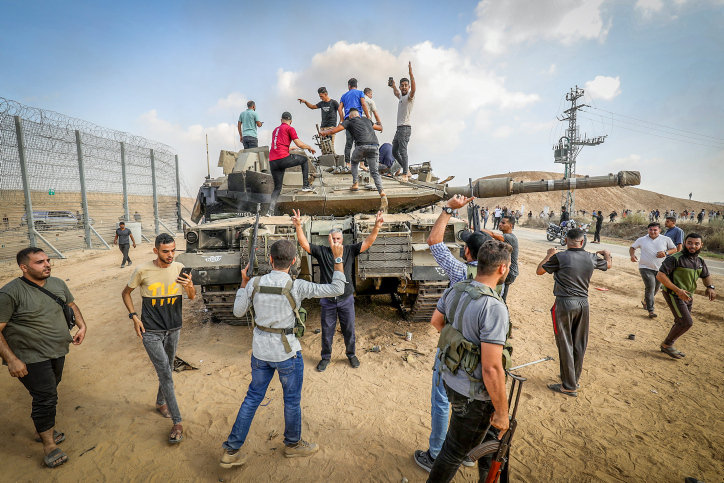
In an interview with Davar, Orit Perlov, a researcher at the Institute of National Security Studies explains the context of the Hamas attack, which has already claimed more than 1,200 Israeli lives, and examines potential scenarios for the war that has since broken out.
Was there tension before [the war broke out]?
In the last few weeks, Hamas organized actions alongside the fence. At the same time, rockets were fired towards the sea almost every day. The Egyptians announced that the armed forces were conducting maneuvers. We are used to such maneuvers and the firing of rockets into the sea. This is no longer a cause for alarm. We thought it was part of the 36th anniversary celebrations that Islamic Jihad mentioned yesterday. After the negotiations were successful, Hamas dispersed the protesters from the fence and created a false representation of the end of the action. They sent their restraining forces against the young men at the fence, finished the maneuvers, and gathered the forces. Everything seemed as though they were ending the action. They were in the last days. Attempts were made to breach the fence at various points, but no one thought it was part of a master plan, because we had just reached an agreement.
What is the master plan?
A campaign like we’ve seen here in the last few days is not something improvised. Hamas is acting according to a plan that required months of work, maybe years. Hamas studied the fence well, they marked the targets in advance: the IDF's activity during the holidays, the music festival, the kibbutzim. They planned everything carefully. We have another intelligence failure here that we didn't know about this plan. We feared an unusual security event during the holidays, but we never imagined such a scenario of hordes of terrorists entering Israel from different points, slaughtering and kidnapping everyone nearby. I think Hamas was also surprised by the ease with which they enacted their plan.

What about Iran?
Iran does not initiate events in the Palestinian sector, it rides on events. Iran helps the armed factions with funding, arms shipments, and strategic direction. It does not tell them when to open fire, but there is no doubt that the timing here plays in its favor. There is no greater beneficiary than Iran regarding the normalization issue with Saudi Arabia, But this does not mean that Iran initiated the attack.
So is there an attempt to thwart normalization agreements?
This attack was prepared a year in advance, and I don't think what Hamas had in mind was the thwarting of normalization. Although Iran gives Hamas and especially Islamic Jihad funding, training, and backing, Iran does not make the decisions. Iran would be happy to send weapons, but it is not the one that gives the order to launch an attack. Iran is supporting and fueling, but this is a Palestinian story. Before the holidays, senior Iranian officials visited Beirut, where they met senior officials from Hamas and Islamic Jihad. There was also a gathering of the factions in Turkey. These are things that jumpstart the security system, because they are usually followed by action. That's why we came up with many scenarios. Unfortunately, what is happening is much worse than what we predicted.
Jewish Vindictiveness is Cause for Concern
Perlov said that Hamas Chief of Staff Mohammed Deif listed five motives for the war in a speech.
The first is to break the siege on Gaza—something that had not come up at all in talks with mediators.
The second is the issue of Palestinian prisoners held in Israel. There was a huge disparity between Hamas’ demands of Hamas regarding prisoner and missing persons release and what Israel was willing to offer. Hamas realized that they need a stronger bargaining chip—more abductees.
The third is the so-called “invasion of Al-Aqsa Mosque.” The mosque, which is the third-holiest site in Islam, is located on the site of the Temple Mount, the holiest site in Judaism. Recent events like shofar blowing on the Temple Mount, Knesset Members entering the site, and attempts to perform ritual sacrifices there have incited Hamas’ anger.
The fourth is the rampage of Israeli settlers on the Palestinian town of Huwara earlier this year.
The fifth is the more than 250 Palestinians killed this year by the Israel Defense Force in the West Bank.
Where is [the war] going?
First, the security forces need to gain control of the fence and clear the rear from terrorists. This has not yet been achieved. As long as we do not achieve this, we will not be able to continue to other targets. The campaign that will develop later is complicated because of the large number of abductees. As soon as Hamas publishes photos and videos of the abductees—especially the women and children—this will increase the ardor of revenge on both sides. It will also strengthen the motivations of Arabs to carry out terrorist attacks, and it will further aggravate the vengeful instinct of Jewish terrorism.
In the case of another mega-terrorist attack—whether from Jews or Palestinians—things will only get worse. The factions in the West Bank will enter the picture. It is likely that the thousands of Palestinians in Lebanon and Syria, and, in Hamas' fantasy, also the Arabs of Israel, will join. These are the horrors of a multi-faceted war. I do not envy the generals who will have to decide in such a scenario where to put the forces. The blanket is too short, and any side that pulls it will inevitably expose another side. The wet dream of the resistance axis is what they call the ‘internal arena’—a war within Israel’s mixed [Jewish-Arab] cities.
Another scenario is that the IDF will eliminate some multitudes of terrorists in the Gaza Strip, and in response Hamas will activate its people in the West Bank, in East Jerusalem, and on the northern border. This is also a scenario in which we understand how it may start, but no one knows how it will end.
Knowns and Unknowns
Perlov estimates that if there is a ground entry into Gaza then the likelihood that Hezbollah will become more involved is high: "At least that's what the organization's leaders claim. We may see operations by special units rather than a widespread invasion, which will allow Hezbollah to respond in a localized way rather than in an all-out war. It should be remembered that the Palestinian cities in the West Bank, Jenin and Nablus, are also sensitive areas. It is not possible to transfer the central command to the Gaza Strip. The IDF is prepared for war in several sectors, and this makes it difficult to react."
What about the abductees?
This is an unprecedented event. I hope we will see a big and general deal here to release all the abductees in exchange for the return of prisoners. It is clear that if there is such a deal, Ben Gvir will have to decide whether to stay in the government and be a signatory to the biggest terrorist release deal in history, or to resign. I don't see there being another solution to this situation besides such a deal.
What’s happening on social media?
There’s a desire for revenge of an unprecedented scale on both sides. The videos of women and children held captive by Hamas create a very strong effect on the masses. The desire for revenge on the Jewish side is of great concern. There is a real fear of a major act of Jewish terrorism like the massacre of Baruch Goldstein in the Cave of the Patriarchs. Something like this could completely change the face of this war, expanding its reach to different arenas. What happens on the networks is another weak point of ours. We have no control over what happens there, and it looks bad from all directions.






